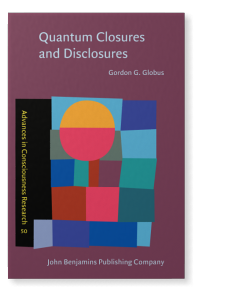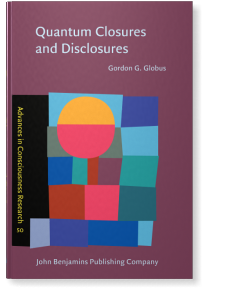Quantum Closures and Disclosures
Thinking-together postphenomenology and quantum brain dynamics
Author
Netlibrary e-Book – Not for resale
ISBN 9781423772262
Quantum Closures and Disclosures thinks together two seemingly irreconcilable discourses: An application of quantum field theory to brain functioning, called quantum brain dynamics, and the continental postphenomenological tradition, especially the work of Martin Heidegger and Jacques Derrida. Underlying both developments is a new ontology of nonCartesian dual modes whose rich provenance is their "between." World is disclosed in the lumen naturale of dual modes belonging-together in their between; all presencing is a function of a "~conjugate" form of match in the between. This surprising rapprochement between a powerful tradition within continental philosophy and the 20th-century quantum revolution in science is fruitfully applied to crucial issues in philosophy, brain science, mathematics and psychiatry.
Related Titles: Quantum Brain Dynamics and Consciousness: An introduction, edited by Mari Jibu and Kunio Yasue (1995), and My Double Unveiled: The dissipative quantum model of the brain, by Giuseppe Vitiello (2001)
Related Titles: Quantum Brain Dynamics and Consciousness: An introduction, edited by Mari Jibu and Kunio Yasue (1995), and My Double Unveiled: The dissipative quantum model of the brain, by Giuseppe Vitiello (2001)
[Advances in Consciousness Research, 50] 2003. xxii, 200 pp.
Publishing status: Available
© John Benjamins Publishing Company
Table of Contents
-
Abbreviations | p. x
-
Acknowledgements | p. xi
-
Pre-amble | p. xiii
-
1. Heidegger and the Quantum Brain | p. 1
-
2. PostHeideggerian Postphenomenology and the Quantum Brain | p. 73
-
3. Derrida and the Quantum Brain | p. 123
-
4. Post-amble | p. 167
-
-
Index | p. 189
“Gordon Globus, in his new volume, has taken neurophysics one decisve step further. He has broken the monopolistic grip of consciousness itself on quantum theories of the mind. [...] Given the generally problematic nature of defining boundaries between conscious subject and intended object in quantum measurement, and given isomorphisms between existential praxis and quatum observables as active operators, Globus's massive shift toward authentic self-eccentricity should resonate widely among post-classical neurophysicists as a welcome Copernican breaktrough.”
Donald Mender, M.D., Clinical Assistant Professor of Psychiatry and the behavioral Sciences, New York Medical College, in NeuroQuantology, Issue 4, 2004
“[...] one of its great virtues is the effort put into guiding the reader trough some of the most difficult ideas of contemporary academic culture. [...] It offers an excellent introduction to contemporary phenomenology [...].”
Paavo Pylkkänen, University of Skövde, in the Journal of Consciousness Studies, Vol. 11 - 12, 2004
“[...]one of its great virtues is the effort put into guiding the reader trough some of the most difficult ideas of contemporary academic culture. It should facilitate understanding of Vitiello's far from mainstream theory, which may well merit sympathetic consideration.
[...] offers an excellent introduction to contemporary post-phenomenology, while deepening Globus's own themes.
”
Paavo Pylkkänen, University of Skövde, in the Journal of Consciousness Studies, Vol. 11-12, 2004
Cited by (9)
Cited by nine other publications
Globus, Gordon & Massimo Cocchi
Blanquet, Pierre R.
Pylkkänen, Paavo
Tonello, Lucio, Massimo Cocchi, Fabio Gabrielli & Jack A. Tuszynski
Vergauwen, Roger
Globus, Gordon
Globus, Gordon
Walach, Harald & K. Helmut Reich
This list is based on CrossRef data as of 14 july 2024. Please note that it may not be complete. Sources presented here have been supplied by the respective publishers. Any errors therein should be reported to them.
Subjects
Consciousness Research
Philosophy
Main BIC Subject
JMT: States of consciousness
Main BISAC Subject
PSY008000: PSYCHOLOGY / Cognitive Psychology & Cognition

